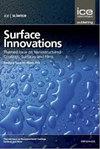钙钛矿太阳能电池中的缺陷与钝化
IF 3.5
4区 材料科学
Q3 CHEMISTRY, PHYSICAL
引用次数: 5
摘要
这种有机-无机杂化钙钛矿材料以其高吸收系数、低成本和简单的薄膜沉积技术而备受关注。基于这些优势,钙钛矿太阳能电池已经达到了超过25%的令人印象深刻的功率转换效率。然而,低温过程不可避免地导致钙钛矿膜中存在大量缺陷。这些缺陷会加剧载流子复合,导致晶体退化、相变,严重影响器件的性能。研究钙钛矿薄膜中的缺陷对开发高性能钙钛矿太阳能电池具有重要意义。在此,作者总结了缺陷的原因、分布和特征,以及它们对钙钛矿太阳能电池性能的影响。此外,还分别讨论了钙钛矿薄膜或器件上的一些缺陷钝化策略,包括晶界钝化、表面钝化、覆盖层改性和电荷传输层钝化。最后,提出了钙钛矿太阳能电池商业化的一些剩余挑战。本文章由计算机程序翻译,如有差异,请以英文原文为准。
Defects and passivation in perovskite solar cells
This organic-inorganic hybrid perovskite materials have attracted great attention by virtue of their high absorption coefficient, low cost and simple film deposition technique. Based on these advantages, perovskite solar cells have reached an impressive power conversion efficiency over 25%. However, the low-temperature process inevitably leads to a large number of defects in the perovskite film. These defects would exacerbate the carrier recombination, induce crystal degradation, phase transformation and seriously affect the performance of devices. Studying the defects in perovskite film is of great significance for the development of high-performance perovskite solar cells. Herein, the authors summarise the causes, distribution and features of defects, as well as their effects on the performance of perovskite solar cells. Furthermore, some defect-passivation strategies on perovskite film or the device, including grain boundary passivation, surface passivation, capping layer modification and charge transport layer passivation, are discussed, respectively. Lastly, some remaining challenges in the commercialisation of perovskite solar cells are proposed.
求助全文
通过发布文献求助,成功后即可免费获取论文全文。
去求助
来源期刊

Surface Innovations
CHEMISTRY, PHYSICALMATERIALS SCIENCE, COAT-MATERIALS SCIENCE, COATINGS & FILMS
CiteScore
5.80
自引率
22.90%
发文量
66
期刊介绍:
The material innovations on surfaces, combined with understanding and manipulation of physics and chemistry of functional surfaces and coatings, have exploded in the past decade at an incredibly rapid pace.
Superhydrophobicity, superhydrophlicity, self-cleaning, self-healing, anti-fouling, anti-bacterial, etc., have become important fundamental topics of surface science research community driven by curiosity of physics, chemistry, and biology of interaction phenomenon at surfaces and their enormous potential in practical applications. Materials having controlled-functionality surfaces and coatings are important to the manufacturing of new products for environmental control, liquid manipulation, nanotechnological advances, biomedical engineering, pharmacy, biotechnology, and many others, and are part of the most promising technological innovations of the twenty-first century.
 求助内容:
求助内容: 应助结果提醒方式:
应助结果提醒方式:


